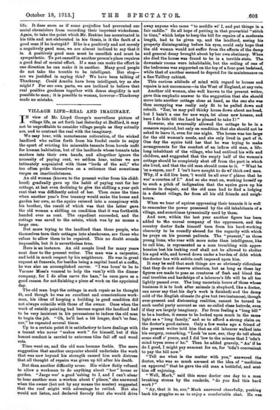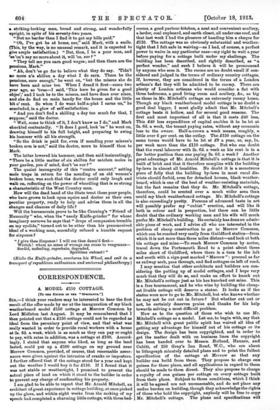VILLAGE LIFE—REAL AND IMAGINARY.
TN view of Mr. Lloyd George's marvellous picture of village life, as set forth last Saturday at Bedford, it may not be unprofitable to consider village people as they actually are, and to contrast the real with the imaginary.
We may hear, with monotonous reiteration, of the wicked landlord who sallies forth from his feudal castle to enjoy the sport of evicting his miserable tenants from hovels unfit for human habitation, but of the landlords whose tenants take matters into their own hands, and altogether ignore the necessity of paying rent, we seldom hear, unless we are intimately acquainted with these "lords of the soil," who too often pride themselves on a reticence that sometimes verges on inarticulateness.
An old woman (known to the present writer from his child- hood) gradually gave up the habit of paying rent for her cottage, at last even declining to give the shilling a year quit rent that was diffidently asked of her. Then came the time when another year's free tenancy would make the house and garden her own, so the squire entered into a conspiracy with his brother, the result of which was that the latter gave the old woman a shilling on condition that it was forthwith banded over as rent. The expedient succeeded, and the cottage was saved to the estate, which was by no means a large one, But more trying to the landlord than these people, who themselves turn their cottages into almshouses, are those who refuse to allow them to be repaired. This no doubt sounds impossible, but it is nevertheless true.
Here is an instance. An old couple lived for many years next door to the present writer. The man was a carpenter, and held in much respect by his neighbours. He was in great request at funerals, for besides being a capital hand at a coffin, he was also an accomplished carver. "I was boun' to be to Varmer Moss's vuneral to help the vam'ly with the dinner company, for I do allus carve the ham," he once gave as a good reason for not finishing a piece of work on the appointed day.
The old man kept the cottage in such repair as he thought fit, and though he was an excellent and conscientious work- man, his ideas of keeping a building in good condition did not always coincide with those of the owner. Once when the work of outside painting had become urgent the landlord had to be very insistent in his persuasions to induce the old man to begin the job. "Oh, he'll last a bit longer, don't 'co fear, zur," he repeated several times.
Up to a certain point it is satisfactory to have dealings with a tenant who never "makes work" for himself, but if this honest conduct is carried to extremes tiles fall off and wood rota Time went on, and the old man became feeble. The mere suggestion that another carpenter should undertake the work that was now beyond his strength caused him such distress that all thought of repairs was given up till after his death.
But then another difficulty arose. His widow flatly refused to allow a workman to do anything about " her " house or garden. "Jorge wer' a good 'usbing to I, and I can't abear to hear another man a-worken about t' plaece," she answered when the owner (but not by any means the master) suggested that the roof might with advantage be retiled. But she would not listen, and declared fiercely that she would drive away anyone who came "to meddle wi' I, and put things in a fair caddie." So all hope of putting in that proverbial "stitch in time," which helps to keep the bill for repairs of a moderate length, had to be given up, and the landlord, seeing his property disintegrating before his eyes, could only hope that the old woman would not suffer from the effects of the damp and general decay brought about by her own obstinacy. When she died the house was found to be in a terrible state. The downstair rooms were inhabitable, but the ceiling of one of the bedrooms was supported on the top of a four-post bedstead, while that of another seemed to depend for its maintenance on a fine Tallboy cabinet.
This curious attitude of mind with regard to houses and repairs is not uncommon—in the West of England, at any rate.
Another old woman, also well known to the present writer, gave this emphatic answer to the suggestion that she should move into another cottage close at hand, as the one she was then occupying was really only fit to be pulled down and rebuilt. " Zur, 'ee may pull thicky house down about me head, but I bain't a one for new ways, let alone new honsen, and here I do bide till the Lard be pleased to take I!"
However, she eventually allowed the cottage to be in a measure repaired, but only on condition that she should not be asked to leave it, even for one night. The house was too large for the old woman's needs, and she only lived in part of it. One day the squire told her that he was trying to make arrangements for the comfort of an infirm old man, a life- long inhabitant of the village, who had outlived his wife and children, and. suggested that the empty half of the woman's cottage should be completely shut off from the part in which she lived, and that the old man should come to IL " What be 'oe a-sayen, zur ? I 'on't have nought to do wi' thick owd man. Why, if a did live here, 't would be all over t' plaece that he wer' a-courten of I." And so she went on, working herself up to such a pitch of indignation that the squire gave up his scheme in despair, and the old man had to find a lodging in a distant village, far from all his old friends and neigh- bours.
When we hear of squires oppressing their tenants it is well to remember the power possessed by the old inhabitants of a village, and sometimes tyrannically used by them.
And now, within the last year another figure has been added to the unreal company of the oppressors, and the country doctor finds himself torn from his hard-working obscurity to be roundly abused for the rapacity with which he preys on his poorest patients. The "peasant," as these young lions, who roar with more noise than intelligence, like to call him, is represented as a man trembling with appre- hension lest his leaking roof shall not be allowed to shelter his aged wife, and bowed down under a burden of debt which the doctor has with subtle craft imposed upon him.
It may be said that such things are so obviously ridiculous that they do not deserve attention, but as long as these lay figures are made to pose as creatures of flesh and blood the real troubles and hardships of a labourer's life will be all too lightly passed over. The long uncertain hours of those whose business it is to look after animals (a shepherd, like a doctor, can never say that his day's work is finished) and the damp cold of the English climate (to give but two instances), though ever-present and distressing realities, cannot be turned to such useful party account as can so-called class hatreds, even if they are largely imaginary. Far from feeling a "long bill" to be a burden, it seems to be looked upon much in the same light as a "long family," and so to afford a strong claim on the doctor's good-nature. Only a few weeks ago a friend of the present writer told him that an old labourer walked into his surgery, remarking, "Look 'ce now, zur, they do tell about some stuff o' yourn, and I did 'low to the missus that I 'udn't mind tryen some o' he." Then he added gravely, "An' if he do I good, I might pay summat for un, for 'tidn't convenient to pay the bill now."
"Tell me what is the matter with you," answered the doctor, who was so much amused at the idea of "medicine on approval" that he gave the old man a bottleful, and sent him off rejoicing.
"Well, Mark," said this same doctor one day to a man breaking stones by the roadside, "do you find this hard work ? "
"Ay, that it be, zur," Mark answered cheerfully, pushing back his goggles so as to enjoy a comfortable chat. He was
a striking-looking man, broad and strong, and wonderfully upright, in spite of his seventy-two years.
"But no harder than I find it to get my bills paid."
"Oh, I've got he at home, zur," said Mark, with a smile.
(This, by the way, is no unusual remark, and it is expected to give ample satisfaction.) "But, then, I be a poor man, and 'ee'on't zay no more about it, will 'ee, zur ? "
" They tell me you earn good wages ; and then there are the pensions, Mark."
" Ah, don't 'ee go for to believe what they do zay. 'Tidn't
10 more n'a shillun a day what I do earn. There be the pensions, sure enough," be went on, "but the missus she do have hern and mine too. When I draed it first—come two year ago, so 'twas—I said, 'This here be given for a good
objec',' and I took he to the raissus, and have done ever since, and she do find un main handy for the house and the little
bit o' rent. So when I do want half-a-pint I earns un," he concluded, in a glow of self-satisfaction.
"And you don't find a shilling a day too much for that, I suppose," said the doctor.
"Well, come to think of it, I don't know as I do," and Mark
chuckled contentedly. "It does I good, look 'ee" he went on, drawing himself to his full height, and preparing to swing his hammer with all his strength.
"So the drink is paid for, even if mending your missus's broken arm is not," said the doctor, more to himself than to Mark.
The latter lowered his hammer, and then said insinuatingly, "There be a little matter of six shillun for catchen moles in your garden, you d' mind, don't 'ee zur ? "
The quaint incongruity of this "contra account," setting
mole traps in return for the mending of an old woman's broken bone, was such that the doctor could only laugh and walk on, reflecting on the power of wheedling that is so strong a characteristic of the West Country man.
How will the dead band of the State treat these poor people, who have grown to look upon squire and doctor as their own peculiar property, ready to help and advise them in all the changes and chances of daily life ?
Will the bureaucrats prove to be like Canning's "Friend of Humanity" who, when the "needy Knife-grinder" for whose imaginary sorrows he says that" drops of compassion tremble
on my eyelids," turned out to be other than his preconceived ideal of a working man, scornfully refused a humble request
for sixpence?
"I give thee Sixpence! I will see thee damn'd first— Wretch ! whom no sense of wrongs can rouse to vengeance— Sordid, unfeeling, reprobate, degraded,
Spiritless outcast! "
(Kicks the Knife-grinder, overturns his Wheel, and ex-it in a transport of republican enthusiasm and universal philanthropy.)















































 Previous page
Previous page